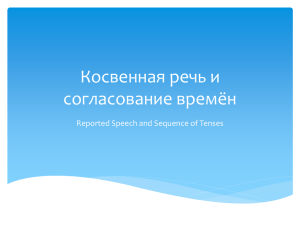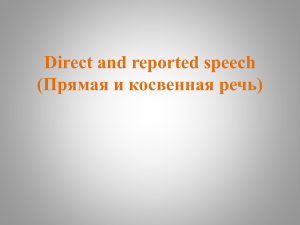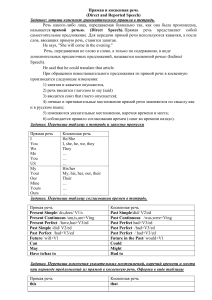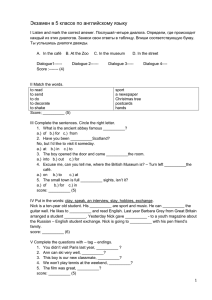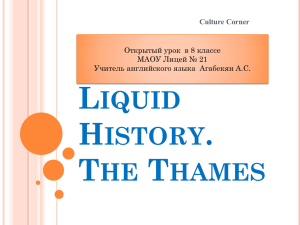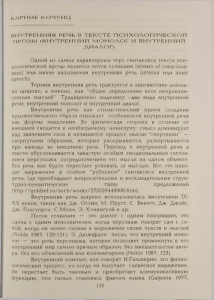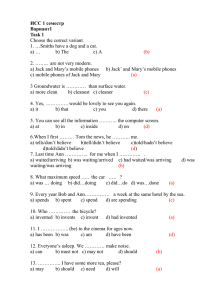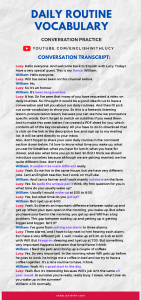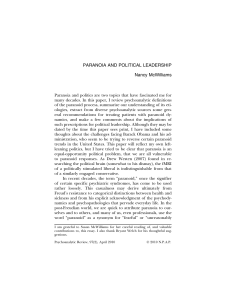ГРАММАТИКА Косвенная речь в утверждениях (Reported Speech in Statements).
advertisement

1. 2. 3. 4. 5. ГРАММАТИКА Косвенная речь в утверждениях (Reported Speech in Statements). 1. Ann says: “I love my dog”. 1. Ann says she loves her dog. 2. Ann says to Jane: “We went to the 2. Ann tells Jane they went to the museum on Sunday”. museum on Sunday. Упражнение 8. Вот что говорит Эми своей подруге Лиз. Поставьте эти предложения в косвенную речь: Пример: “I like sports”. – Amy tells Liz she likes sports. “I don’t like people who deceive 6. “I always wear clothes that suit me”. others”. 7. “I have sent a letter to my aunt”. “I have put on some weight lately”. 8. “We have made great progress in “We’re going to our country house English”. soon”. 9. “I won’t invite many people to my “I spend too much time talking on the birthday party”. phone”. 10.“I can’t drive”. “I am a smart student”. Правила согласования времен (The Sequence of Tenses) Если глагол-сказуемое главного предложения стоит в прошедшем времени, то в косвенной речи применяется правило согласования времен. Упражнение 10. Переведите предложения в косвенную речь: Пример: “I am glad to see you”. – John told Michael he was glad to see him. 1. “I’ve been working for the Penguin Books for a year already”. 2. “My sister moved to a country cottage on Sunday”. 3. “A lot of new houses have been built in our street”. 4. “Jane is taking yoga classes”. 5. “My cousin Peter lives in a small one-bedroom flat in the northern part of the city”. 6. “You can come and see me and Jane anytime”. 7. “I’ll write a letter to you when I am in Egypt”. 8. “Teresa and Tom have started a small business together”. 9. “George is going to try to enter the university in summer”. 10.“The bank in Green Street was robbed on the 12th”. При переводе предложений в косвенную речь необходимо помнить о замене некоторых местоимений и наречий: today now tonight tomorrow the day after tomorrow next week in 3 days that day then that night the next day two days later the next week / the following week three days later yesterday last week 2 days ago this these here the day before the week before/the previous week two days before that those there Упражнение 12. Переведите предложения в косвенную речь, обращая внимание на изменения обстоятельств времени: 1. Jerry said: “We are going away for two weeks tomorrow”. 2. She said: “I met Bet by chance yesterday”. 3. My brother said: “I don’t like this kind of music”. 4. Liz said: “I think we will spend our holiday in Venice next year”. 5. He said: “My brother is returning to Moscow in 4 days”. 6. They said: “The board meeting will be held next Monday”. 7. She said: “I’m writing a letter to my friend now”. 8. Ted said: “Last year Jenny sold her old car”. 9. Dad said: “Kate is taking her exam today”. 10.She said: “Mary got married two years ago”. ГРАММАТИКА Просьбы и указания в косвенной речи. (Requests and Offers in the Reported Speech) Smb. tells smb. to do smth. asked not to do smth. orders Для перевода просьб и указаний в косвенную речь используются глаголы tell (требовать), ask (просить), order (приказывать), recommend (рекомендовать), beg (просить) и другие. Examples: Mother said to her son: “Open the window!” Mother told her son to open the window. Jill said to her friend: “Do not speak so loudly, please”. Jill asked her friend not to speak so loudly. But! Andy said: “Let’s buy this nice toy car”. Andy suggested buying that nice toy car. Упражнение 20. Переведите предложения в косвенную речь: 1. The teacher said to the students: “Close your books and start working on the composition”. 2. Jane said: “Ann, could you please lend me some money till Saturday?” 3. Tim said: “Let’s go to the cinema”. 4. Mother said to us: “Do not go out without your coats on”. 5. The lieutenant said to the soldiers: “Don’t talk while marching!” 6. Alex said: “John, pass me the bread, please”. 7. Angela said: “What about going for a long walk tonight?” 8. The doctor said to Chris: “Don’t stay outdoors for too long.” 9. Dad said: “Kathryn, don’t tease your sister!” 10.Mary said: “Will you please hold the door open for me, Andy?” Вопросы в косвенной речи (Questions in the Reported Speech) Прямая речь Косвенная речь 1. “Do you speak English?” 1. I don’t know if (whether) you speak English. 2. “Is there a bus stop near here?’ 2. Can you tell me if (whether) there is a bus stop near here? 3. “Will Jack join us?” 3. I am not sure if (whether) Jack will join us. 4. “Did you watch this film 4. Nick asks if (whether) I watched this film yesterday?” yesterday. 5. “Have you got a car?’ 5. My friend asks if (whether) I have got a car. Специальные вопросы присоединяются к главному предложению с помощью вопросительных слов. Порядок слов в придаточном предложении становится прямым. Прямая речь Косвенная речь 1. “Where is Jack?” 1. I wonder where Jack is. 2. “Which of the books do you like best?’ 2. I have no idea which of the books you like best. 3. “What are you doing tonight?” 3. I’d like to know what you are doing tonight. 4. “Why are you so sad?” 4. He asks why I am so sad. 5. “When did you come back?” 5. He asks when I came back. Упражнение 21. Перефразируйте предложения по образцу: Образец: “Can you swim?” – I wonder … - I wonder if you can swim. 1. “Where is Alice?” – I have no idea … 7. “Will you be present at the conference?” – 2. “How much does this sweater cost?” – TellI’d like to know … me … 8. “Where and when did we meet?” – I can’t 3. “Where is the nearest post office?” – Do youremember … know … 9. “How can I get to the airport?” – Will you 4. “Is Jane coming to the reception?” – Iplease explain to me … wonder … 10.“Do I have to book the rooms in this hotel 5. “Who is the tall handsome guy over there?”in advance? – I’m not sure… – I don’t know … 6. “What is the time?” – Could you tell me … Прямая речь Косвенная речь 1. Jack asked Kate: “Did you enjoy your 1. Jack asked Kate if she had enjoyed holiday?” her holiday. 2. Jack asked Kate: “What are you going to 2. Jack asked Kate what she was going give Ted for his birthday?” to give Ted for his birthday. Упражнение 22. Переведите следующие общие вопросы в косвенную речь. Пример: “Have you ever traveled abroad?” – Ann asked Kate if she had ever traveled abroad. 1. “Do you speak French?” 3. “Does your Dad go to work by car?” 2. “Can you play basketball?” 4. “Have you ever been abroad?” 5. “Did you study well at school?” 9. “Did Mary call you up as promised 6. “Will you be at home tomorrow?” yesterday?” 7. “Are you feeling hungry?” 10.“Have you got a large flat?’ 8. “Is your brother at work now?” Упражнение 23. Переведите вопросы в косвенную речь. Эти вопросы Джейн задала своей подруге Мэри: 1. “How long have you been away?” 7. “When will you be able to call at my 2. “Where are you staying?” place?” 3. “What are you going to do at the 8. “Where did you have your hair cut?” weekend?” 9. “What will you be doing this 4. “Why didn’t you phone me summer?” earlier?” 10. “Where did you go for your last 5. “What kind of car have you got?” holiday?” 6. “How much money did you spend on your trip?” Употребление некоторых устойчивых выражений в косвенной речи Прямая речь Косвенная речь 1. Nick said: “Thank you, Andy”. 1. Nick thanked Andy. 2. Nick said: “Hello, Tom”. 2. Nick greeted Tom. 3. Nick said: “I am sorry, I am late”. 3. Nick apologized for being late. 4. Nick said: “Good bye, Ted”. 4. Nick said good bye to Ted. 5. Nick asked: “Do you like chocolate 5. Nick asked Helen if she liked ice cream, Helen?” chocolate ice cream. Helen said she did. Helen said: “Yes, I do”. 6.Nick asked: “Did you go to the Nick asked Helen if she had gone to the cinema yesterday?” cinema the day before. She said she Helen said: “No, I didn’t”. hadn’t. Упражнение 24. Передайте следующий диалог в косвенной речи: Lucy: Hello, Nancy! I haven’t seen you for such a long time. What have you been doing? Nancy: Hi, Lucy. It’s nice to see you again. I worked really hard last month as I was getting ready for my school exams. Lucy: Were they difficult? Nancy: No, not really. I passed them with good marks. Next week I’m going to the South with my parents. Lucy: Congratulations! That’s good news. Nancy: And what are your plans for the summer? Lucy: Oh, I don’t know yet. You see, I’ve got a new boyfriend and so I may stay in town for the summer. Nancy: What is his name? Lucy: Andrew. He is very nice indeed. He is kind, honest and easy-going. By the way how is Paul? Nancy: He is fine. Why don’t we all go to the fun park at the weekend? Lucy: Good idea. Call me on Friday, ok? Nancy: Ok, bye then


